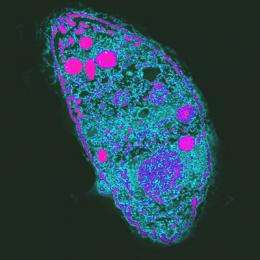Study turns parasite invasion theory on its head

Current thinking on how the Toxoplasma gondii parasite invades its host is incorrect, according to a study published today in Nature Methods describing a new technique to knock out genes. The findings could have implications for other parasites from the same family, including malaria, and suggest that drugs that are currently being developed to block this invasion pathway may be unsuccessful.
Toxoplasma gondii is a parasite that commonly infects cats but is also carried by other warm-blooded animals, including humans. Up to a third of the UK population are chronically infected with the parasite. In most cases the acute infection causes only flu-like symptoms. However, women who become infected during pregnancy can pass the parasite to their unborn child which can result in serious health problems for the baby such as blindness and brain damage. People who have compromised immunity, such as individuals infected with HIV, are also at risk of serious complication due to reactivation of dormant cysts found in the brain..
Researchers at the Wellcome Trust Centre for Molecular Parasitology at the University of Glasgow made the discovery using a new technique to knock out specific genes in the parasite's genome. They specifically looked at three genes that are considered to be essential for the parasite to invade cells within its host to establish an infection.
"We found that we can remove each of these genes individually and the parasite can still penetrate the host cell, showing for the first time that they are not essential for host cell invasion as was previously thought," said Dr Markus Meissner, a Wellcome Trust Senior Research Fellow who led the study. "This means that the parasite must have other invasion strategies at its disposal that need to be investigated."
The genes the researchers looked at form the core of the parasite's gliding machinery that enable it to move around. In the past, researchers have only ever been able to reduce the expression level of these genes in the parasite, which did lead to a reduction in host cell invasion but invasion was never blocked completely. This was attributed to the low levels of gene expression that persisted. However, with the new technique, the team were able to completely remove the genes of interest. Unexpectedly they found that the parasites were still able to invade.
"One of the genes we looked at is the equivalent of a malaria gene that is a major candidate for vaccine development. Our findings would suggest that such a vaccine may not be successful at preventing malaria infection and we need to revisit our understanding of how this family of parasites invades host cells," added Dr Meissner.
As well as malaria, a number of other parasites that affect livestock also belong to the same family. The findings could also provide clues to new treatments for these diseases, which cause substantial economic losses worldwide.
More information: N. Andenmatten et al. DiCre regulated, efficient genome engineering in Toxoplasma gondii uncovers an alternative invasion pathway. Nature Methods, 2012. [Epub ahead of print]
Journal information: Nature Methods
Provided by Wellcome Trust

















